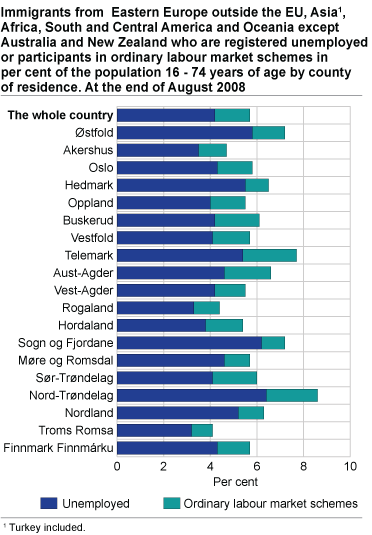Content
Published:
This is an archived release.
Unemployment among immigrants continues to fall
Registered unemployment among immigrants fell from 5.5 per cent in August 2007 to 4.7 per cent in August this year. In the rest of the population, registered unemployment fell from 1.7 to 1.5 per cent during this period.
A total of 11 194 immigrants were registered unemployed in the third quarter of 2008; a fall of 176 from the corresponding quarter last year. On the contrary, there has been an increase of 523 in the number of immigrants on ordinary labour market schemes. Thus the gross unemployment figure (i.e. registered unemployed + participants on ordinary labour market schemes) increased by 347. However, since the number of immigrants in the labour force has risen considerably during the last year, we can also see a fall in the gross employment rate of 0.8 percentage points.
|
Immigrants are defined as being born abroad by foreign-born parents. They must be registered as settled in Norway for at least six months. The figures are based on the Directorate of Labour's register of job seekers and are calculated as a fraction of the labour force. Norwegian-born to immigrant parents (previously referred to as “descendants”) are not counted as immigrants. |
Greatest fall among the Africans
Immigrants from Africa had the largest fall in unemployment since the third quarter last year; down 1.9 percentage points. This group still has the highest unemployment rate at 10.6 per cent. Immigrants from Asia had the second highest rate at 6.6 per cent, while the unemployment rate for immigrants from Eastern Europe (except EU countries) and South and Central America was 5.7 per cent and 4.8 per cent respectively. The unemployment rate for immigrants from Western Europe was exactly at the national average, i.e. 1.8 per cent, while the rates for those from the Nordic countries and the EU countries in Eastern Europe were only a few decimal points higher.
Slightly higher unemployment among women
The unemployment rate for male and female immigrants was 4.2 and 5.4 per cent respectively. In the rest of the population, the unemployment rate was 1.4 and 1.5 per cent for men and women. This is contrary to traditional gender differences in registered unemployment among immigrants where men usually have a higher unemployment rate than women. This new pattern is probably due to an increase in female job seekers caused by the more favourable labour market conditions in Norway in recent years.
Few Norwegian-born to immigrant parents
Only 355 Norwegian-born to immigrant parents (previously referred to as “descendants”) were registered unemployed in August 2008. The majority within this group are aged 16-29 years, and the unemployment rate among them was 2.8 per cent, which was only a few decimal points above the level of the corresponding age group in the population as a whole.
Participants on labour market schemes slightly increased
Despite the falling unemployment rate, there was as mentioned a slight increase in the number of immigrants on ordinary labour market schemes (job programmes) from 2 894 in August 2007 to 3 417 in August 2008, i.e. 523 more participants. In total, 7 665 people participated in labour market schemes. There was also a slight increase of 588 among participants in the majority population.
As a percentage of the immigrant population aged 16-74, the participation rate was 0.9 per cent.
In the rest of the population, the participation rate was 0.1 per cent. There was no change in this rate either among immigrants or the rest of the population. Immigrants from Africa had the highest participation rate at 2.5 per cent in the third quarter this year.
Tables:
- Table 1 Registered unemployed, by immigrant background, region of birth and sex. By the end of August 2007 and 2008. In absolute figures and in per cent of the labour force
- Table 2 Participants on ordinary labour market schemes (job programmes), by immigrant background, region of birth and sex. By the end of August 2007 and 2008. Absolute numbers and in per cent of persons aged 16 to 74 years
- Table 3 Registered unemployed, by region of birth and time of residence in Norway. By the end of August 2007 and 2008. Absolute figures and in per cent of persons in total aged 16-74 years
- Table 4 Registered unemployed, by immigrant background, region of birth and county of residence. By the end of August 2007 and 2008. Absolute numbers and in per cent of persons aged 16 to 74 years in each group
- Table 5 Participants on ordinary labour market schemes (job-programmes) by immigrant background, region of birth and county of residence. By the end of August 2007 and 2008. Absolute numbers and in per cent of persons aged 16 to 74 years in each group
- Table 6 Registered unemployed by sex, immigrant background, region of birth and age. By the end of August 2007 and 2008. Absolute numbers and in per cent of the labour force
Additional information
The unemployment figures are based on the Norwegian Labour and Welfare Organisation’s register of jobseekers and are calculated as a share of the labour force, which is the sum of employed persons and registered unemployed persons, i.e. people offering their labour on the labour market.
Contact
-
Statistics Norway's Information Centre
E-mail: informasjon@ssb.no
tel.: (+47) 21 09 46 42

